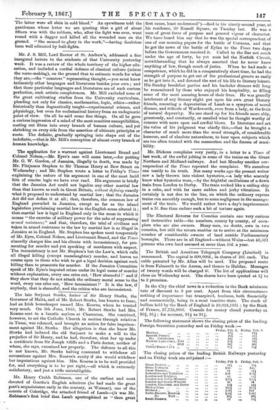Tbe application for a warrant against Lieutenant Brand and Colonel
Nelson,—Mr. Eyre's case will come later,—for putting .Mr. G. W. Gordon, of Jamaica, illegally to death, was made by Mr. Fitzjames Stephen to Sir Thomas Henry at Bow Street on Wednesday ; and Mr. Stephen wrote a letter to Friday's Times explaining the nature of his argument in one of the most lucid bits of concise logic we have ever read. His argument is briefly that the Jamaica Act could not legalize any other martial law than that known as such in Great Britain, without defining exactly what it proposed to understand by martial law; that the Jamaica .Act did not define it at all ; that, therefore, the common law of England prevailed in Jamaica, except so far as the island legislation proclaiming martial law in the English sense altered it ; that-martial law is legal in England only in the sense in which it means "the exercise of military power for the sake of suppressing *armed resistance;" and that, therefore, the trial of civilians not taken in armed resistance to the law by martial law is as illegal in Jamaica as in England. Mr. Stephen has spoken most temperately of Mr. Eyre, Colonel Nelson, and Lieutenant Brand, and the Times absurdly charges him and his clients with inconsistency, for pro- secuting for murder and yet speaking of murderers with respect. 'The inconsistency is not Mr. Stephen's but the Law's, which calls all illegal killing (except manslaughter) murder, and leaves no course open to those who wish to get a legal decision against such killing than to prosecute for murder. If the Jamaica Committee speak of Mr. Eyre's imputed crime under its legal name of murder without explanation, every one cries out, 'How shameful!' and if they show that they do not attach the ordinary moral sense to the word, every one cries out, How inconsistent !' It is the law, if anybody, that is shameful, and the critics who are inconsistent.






























 Previous page
Previous page